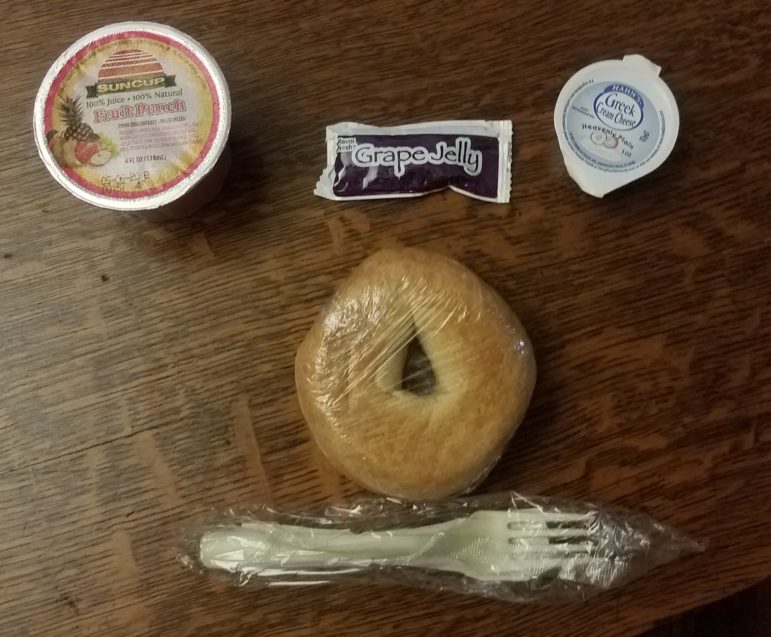Councilman Mark Treyger says the city should tap into the resources it uses to run its senior meal delivery program to offer similar hot food options to students, saying his office has received “numerous complaints” about the current grab-and-go cold meals at schools.

Jarrett Murphy
A to-go breakfast offered by one of the city’s meal hubs this summer.Since the pandemic struck New York in March, the city has faced the colossal task of feeding hungry residents in the face of ever-growing food insecurity and unemployment. This included launching an all-new meal delivery program for seniors as well as setting up hundreds of “grab-and-go” meal hubs at schools across the city, where both students and residents can pick up free meals during the week.
But months later and with winter ahead, one city lawmaker is calling on the Department of Education to improve those meals being offered at schools, where roughly 283,000 students returned for hybrid learning in September. Councilmember Mark Treyger, who heads the council’s education committee, says his office has received “numerous” complaints from families about the quality of school meal options.
His office is specifically calling for the city to begin offering hot meals to kids in lieu of its current pre-packaged cold offerings, which include items like hummus, tuna, yogurt, fruit and sandwiches.
“Expecting students to eat the same cold prepared meals day after day—with as few as three rotating menu options for children with dietary restrictions—is a recipe for adverse academic and behavioral options, as kids choose to skip meals rather than eating what is being provided,” Treyger wrote in a letter sent to the DOE and and other officials on Thursday. He says the city should work with warm meal providers already being used by other agencies, such as those involved in the city’s meal delivery program for seniors.
Some school staff have even reported paying out of pocket to buy outside meals for their students in lieu of the school food, Treyger added.
“Students can’t learn if they are hungry, and we must make sure we are providing meals that are on par with the lunches students can receive during a typical school year,” he wrote.
The DOE says it’s looking at the possibility of adding hot meal offerings to its school menus, but that doing so has been significantly complicated by the pandemic and COVID-19 safety protocols. Schools have stopped serving meals in traditional cafeteria lines in order to comply with social distancing standards, and many schools are currently using cafeterias as classrooms in an effort to space students out. Hot meals are also harder to store safely, since they require being kept above a certain temperature before serving.
“We are exploring ways to have schools opt in to hot meal service for students learning in-person at school, but our priority remains maintaining our high food safety standards and delivering meals in a way that limits the spread of COVID-19,” DOE Spokesman Nathaniel Styer said in a statement. “We have not missed a day of serving meals since our schools closed in March, and with over 65 million meals served since March, our meal program is an incredible success.”
Complaints about the quality of the city’s emergency food offerings aren’t new: while advocates praised the city for its ability to launch meals programs quickly in the wake of lockdown measures this spring, some said the school food hub options—like peanut butter-and-jelly sandwiches offered as a halal meal—were inadequate.
“Many people might think, ‘What’s the big deal? This is a crisis moment, we’re lucky that we’re getting food in the first place.’ My answer to that is, okay. But in the same breath, we have to do better,” one community organizer told City Limits this summer. “We have to just stop accepting good enough and demand better quality.”
Food insecurity has been an ongoing crisis throughout the pandemic: City Harvest, a nonprofit which supplies surplus food to hundreds of soup kitchens and food pantries across the city, said those community food programs it works with saw 7 million visits between March and June alone, a more than 20 percent increase from 2019.








